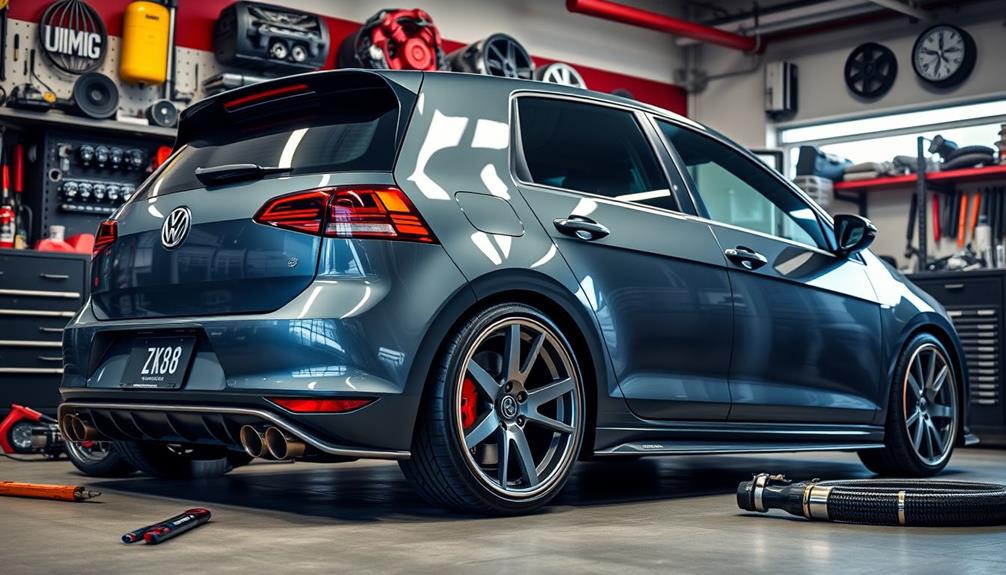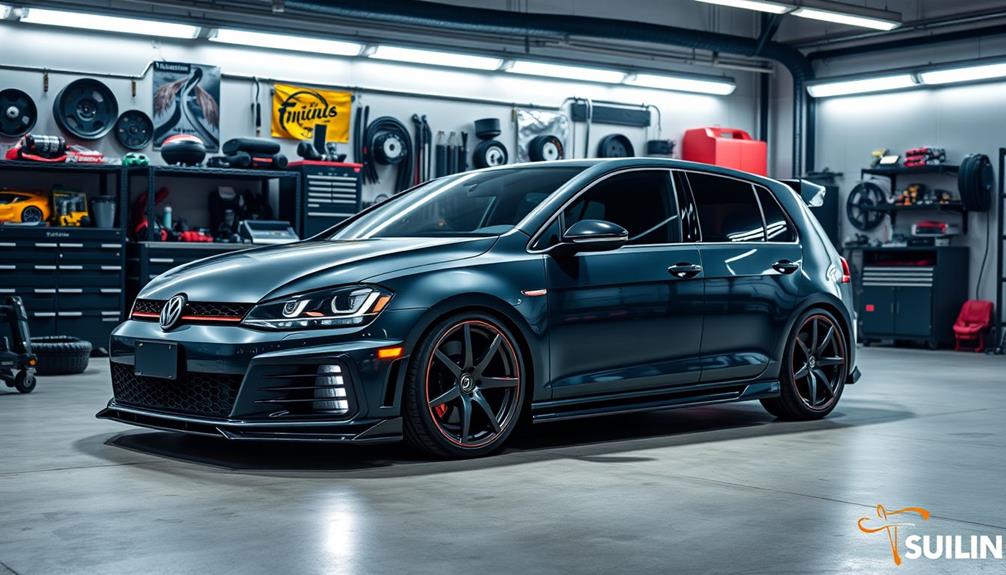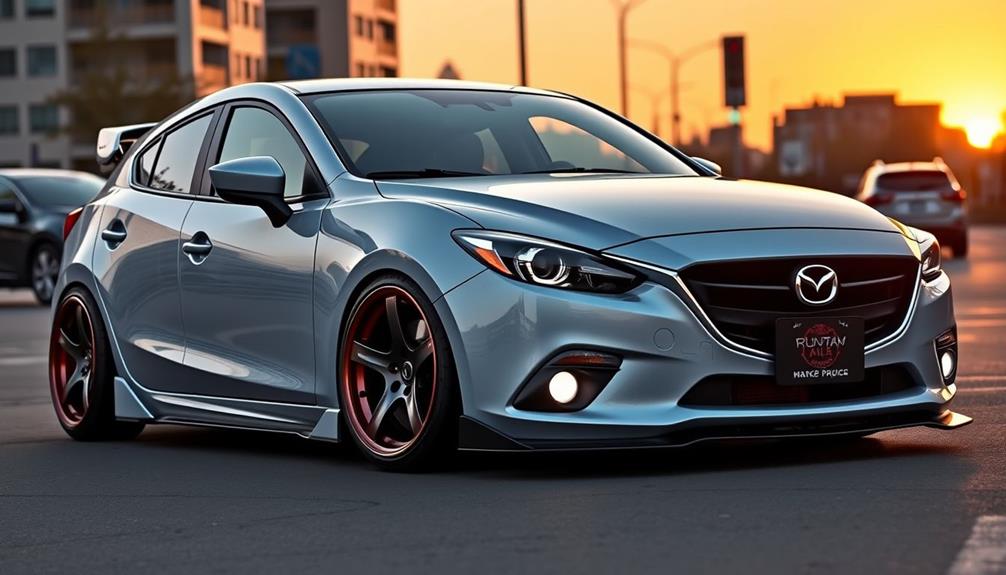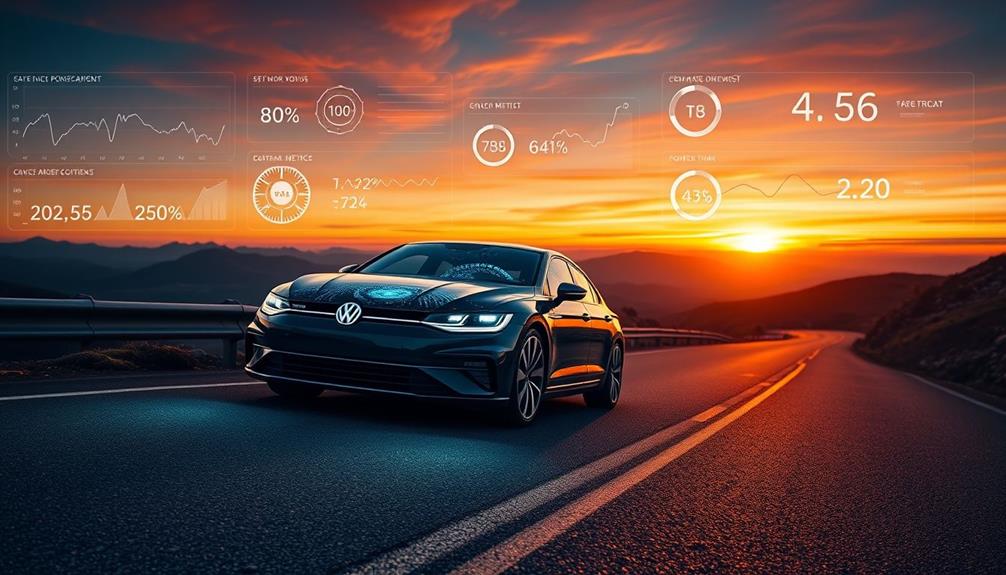Tuning your Volkswagen Golf MK8 can greatly enhance its performance and driving experience. With options like the 034Motorsport Dynamic+ Tuning, you can boost power from 316 hp to an impressive 449 hp on E85. Upgrading components like the COBB Carbon Fiber Redline Intake and high-output ignition coils improves acceleration and throttle response. It's a straightforward process, usually taking just 30-45 minutes via the OBD-II port. Plus, you'll find professional installation support and a 30-day money-back guarantee to ease your mind. Ready to transform your ride? There's plenty more to explore.
Key Takeaways
- Quality tuning can elevate the MK8 Golf R's power from 316 hp to 449 hp, significantly enhancing performance.
- Upgraded air intake systems and high-output ignition coils improve throttle response for quicker acceleration and a sportier driving experience.
- Popular modifications include the COBB Carbon Fiber Redline Intake and Unitronic Stage 1+ Software for optimized engine efficiency.
- Installation is straightforward via OBD-II, typically taking 30-45 minutes, with professional support available from authorized dealers.
- A 30 Day Money Back Guarantee on tuning purchases ensures customer confidence in enhancing their Volkswagen Golf MK8.
Overview of Volkswagen Golf MK8
The Volkswagen Golf MK8 marks a significant leap forward in both design and technology, blending sleek aesthetics with cutting-edge features.
You'll immediately notice how the refined design elements enhance not just the look but also the aerodynamic efficiency of the vehicle, maintaining that iconic Golf silhouette you love.
Under the hood, the MK8 Golf R is powered by a robust 2.0-liter turbocharged engine, delivering an impressive 315 horsepower and 310 lb-ft of torque.
With a swift 0-60 mph acceleration time of just 4.7 seconds, this model truly excels in performance.
The advanced 4MOTION all-wheel drive system boosts traction and control, giving you confidence during diverse driving conditions.
Coupled with a tuned sport suspension, the Golf MK8 offers improved handling dynamics while ensuring a comfortable driving experience.
Whether you're commuting daily or seeking spirited performance on winding roads, the MK8 Golf R adapts seamlessly to your needs.
This blend of power output and technological innovation makes the Volkswagen Golf MK8 a standout choice for enthusiasts who crave both style and substance.
Key Benefits of Tuning

Tuning your Volkswagen Golf MK8 can reveal a world of performance benefits that elevate your driving experience. By investing in a quality tuning solution, you can greatly enhance your engine performance, releasing power gains that can take your stock 316 hp to an impressive 449 hp with options like COBB's Stage 1 Performance Software.
This transformation not only boosts your power but also improves throttle response, allowing for quicker acceleration and reduced 0-60 mph times—some models even achieve this in as little as 4.7 seconds.
Upgrading components like the air intake system, such as the COBB Carbon Fiber Redline Intake, further enhances airflow and efficiency, reducing pre-turbo restrictions. You might also consider an intercooler upgrade to optimize cooling and performance during spirited drives.
Many tuning features, including adjustable fuel maps and crackle overrun options, allow you to customize your driving experience to match your preferences.
Plus, with options like Dynamic+ Tuning from 034Motorsport, installations are simple through the OBD-II port, making it easy to enhance your Golf MK8 without professional help. Embrace tuning and enjoy a more exhilarating ride!
Popular Performance Enhancements

When it comes to enhancing your Volkswagen Golf MK8, several performance upgrades can substantially impact your driving experience. One of the most effective enhancements is the COBB Carbon Fiber Redline Intake System. This aftermarket part reduces pre-turbo restrictions, boosting engine efficiency and delivering a more aggressive turbo sound.
For serious performance tuning, consider the 034Motorsport Dynamic+ Tuning, which can elevate your Golf R's output to an impressive 449 HP and 418 TQ when using E85 fuel.
You can also upgrade to high-output ignition coils for a stronger spark, improving acceleration and overall engine performance. To enhance handling, installing sport springs can lower your car by 20-25mm, optimizing ride height while maintaining comfort.
The Unitronic Stage 1+ Software for the MK8 Golf R is another excellent choice, optimizing ECU calibrations for 93 octane fuel, and yielding a remarkable increase of up to 100 HP and 131 LB-FT of torque compared to stock.
Additionally, consider upgrading your intercooler system to guarantee your engine runs efficiently under increased boost levels. These enhancements not only elevate performance but also contribute to the ongoing mk8 development community.
Aftermarket Modification Options

Numerous aftermarket modification options are available for the Volkswagen Golf MK8, allowing you to tailor performance to your driving style.
One standout is the COBB Carbon Fiber Redline Intake System, which boosts airflow and minimizes pre-turbo restrictions, ensuring your engine operates efficiently. Pairing this with a performance intercooler and upgraded boost hoses is essential for maintaining low intake temperatures, particularly during spirited driving, to protect your engine's health.
For enhanced engine management, consider installing High Output Ignition Coils. They deliver a stronger and more consistent spark, which translates to improved engine performance and reliability.
Additionally, the H&R EBM Electronic Bypass Module can elevate your driving experience by sharpening throttle response and refining shifting characteristics.
If you're focused on maximum performance, look into options like the Integrated Engineering FMIC, which can reduce intake air temperatures by an impressive 74%.
Together with these aftermarket modifications, your EA888 Gen engine will achieve a new level of efficiency and power. With these enhancements, you can truly make your Golf MK8 a reflection of your unique driving preferences.
Installation and Support Resources

A variety of installation and support resources are available to confirm you can successfully enhance your Volkswagen Golf MK8. Installing tuning solutions is straightforward, typically taking just 30-45 minutes via the OBD-II diagnostic port. To assist you, thorough fitment guides confirm proper compatibility checks for your specific model, especially the 2022/2023/2024 vehicles.
| Resource Type | Description |
|---|---|
| Dynamic+ End User Flashing Kit | Required for self-installation, with detailed instructions. |
| Authorized Dealers | Professional installation and expert support. |
| Dedicated Support | Available five days a week for inquiries. |
You can trust the quality of your purchase thanks to a 30 Day Money Back Guarantee on tuning software. This guarantee allows you to enhance your vehicle's performance with confidence. If you encounter any issues, don't hesitate to reach out for support or consult authorized dealers, confirming you're never alone in your tuning journey. Whether you're a seasoned enthusiast or a newcomer, these resources make the installation process seamless and effective for optimizing your Golf MK8's performance enhancements.
Frequently Asked Questions
Can the Mk8 Golf R Be Tuned?
Yes, you can tune the MK8 Golf R. Options like COBB's Accessport and Dynamic+ Tuning offer significant power gains. In just 30-45 minutes, you can enhance performance with various aftermarket modifications and tuning solutions.
How Can I Make My Volkswagen Golf Faster?
To release your Volkswagen Golf's potential, think of it as a racehorse ready to gallop. Consider upgrading the intake, tuning software, and intercoolers while enhancing suspension for better handling—your ride will soar with speed and agility!
How Much Horsepower Does a Stage 1 Tune Add to a Golf R?
A Stage 1 tune can boost your Golf R's horsepower from 316 to about 408 HP with 91 octane, and even up to 427 HP with 93 octane. It's a significant performance enhancement!
What Is the Top Speed of the Golf R Mk8 Performance Pack?
Like a cheetah sprinting across the savannah, the Golf R Mk8 Performance Pack's top speed is electronically capped at 155 mph. With its advanced engineering, it offers thrilling performance, keeping you in control at high speeds.
Conclusion
In summary, tuning your Volkswagen Golf MK8 can transform your driving experience, giving you that extra edge on the road. Did you know that a well-tuned Golf can boost horsepower by up to 20%? Imagine feeling that surge every time you hit the accelerator! With the right modifications and support, you can access your car's full potential and enjoy a thrilling ride. So, why wait? Immerse yourself in the world of tuning and elevate your Golf today! Whether you’re a seasoned enthusiast or new to the scene, the possibilities are endless when it comes to enhancing your ride. From engine upgrades to suspension improvements, Volkswagen Golf IV tuning laid the foundation for the incredible advancements we now see in modern performance tuning. Don’t miss out on making your MK8 stand out from the crowd—start your customization journey today!









